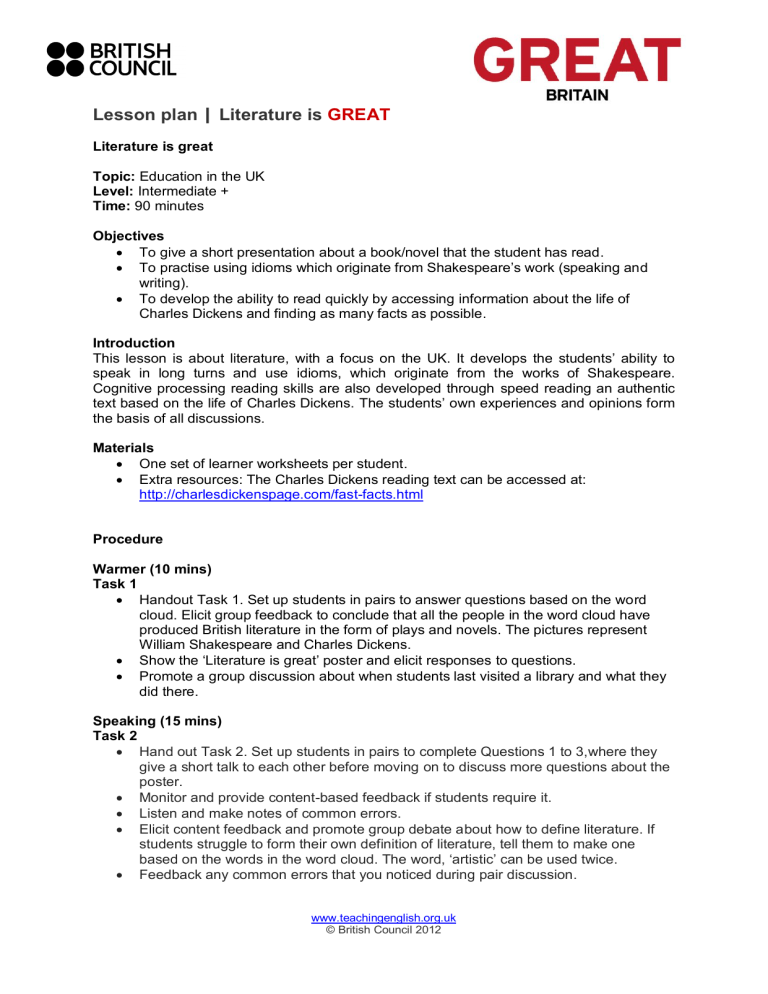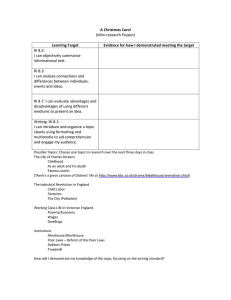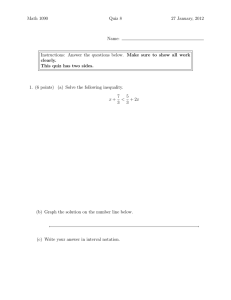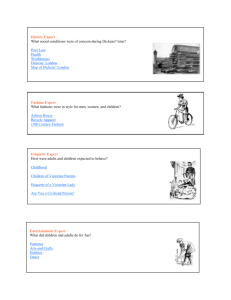
Lesson plan | Literature is GREAT Literature is great Topic: Education in the UK Level: Intermediate + Time: 90 minutes Objectives To give a short presentation about a book/novel that the student has read. To practise using idioms which originate from Shakespeare’s work (speaking and writing). To develop the ability to read quickly by accessing information about the life of Charles Dickens and finding as many facts as possible. Introduction This lesson is about literature, with a focus on the UK. It develops the students’ ability to speak in long turns and use idioms, which originate from the works of Shakespeare. Cognitive processing reading skills are also developed through speed reading an authentic text based on the life of Charles Dickens. The students’ own experiences and opinions form the basis of all discussions. Materials One set of learner worksheets per student. Extra resources: The Charles Dickens reading text can be accessed at: http://charlesdickenspage.com/fast-facts.html Procedure Warmer (10 mins) Task 1 Handout Task 1. Set up students in pairs to answer questions based on the word cloud. Elicit group feedback to conclude that all the people in the word cloud have produced British literature in the form of plays and novels. The pictures represent William Shakespeare and Charles Dickens. Show the ‘Literature is great’ poster and elicit responses to questions. Promote a group discussion about when students last visited a library and what they did there. Speaking (15 mins) Task 2 Hand out Task 2. Set up students in pairs to complete Questions 1 to 3,where they give a short talk to each other before moving on to discuss more questions about the poster. Monitor and provide content-based feedback if students require it. Listen and make notes of common errors. Elicit content feedback and promote group debate about how to define literature. If students struggle to form their own definition of literature, tell them to make one based on the words in the word cloud. The word, ‘artistic’ can be used twice. Feedback any common errors that you noticed during pair discussion. www.teachingenglish.org.uk © British Council 2012 Lesson plan | Literature is GREAT Task 3: Vocabulary – Idioms from Shakespeare’s work (15 mins) Hand out Task 3. Explain that there are many idioms in modern English which originate from the works of Shakespeare. Tell the students to work individually to complete the table by adding the definitions from the bottom of the page. Pair check before eliciting group feedback. Focus on pronunciation as well as meaning. Differentiation: Find out which Shakespeare plays the idioms are from. For early finishers, and if there is internet access, encourage learners to find out which plays the idioms originate from. This could be set as a homework task. Writing a dialogue (20 mins) Students work in pairs to create a dialogue using as many Shakespeare idioms as possible. Ask the students to practise their dialogue aloud and focus on pronunciation as you monitor. If the students wish, they can perform their dialogue in front of classmates, who in turn, will act as the audience. Differentiation: Insults and compliments are a common feature of Shakespeare’s writing and early finishers can add them to their dialogues. They can either create their own or explore the links below. Insults: http://www.cambridgedigital.com/shakespeare-insults Compliments: http://www.folger.edu/documents/KidCompliments.pdf Make a video (If internet access available – for homework or extension in class) Encourage students to develop their dialogues further by turning them into animated videos using a website such as http://goanimate.com/ Task 4: The Life of Charles Dickens Reading Game (15 mins) Hand out task 4 and access the reading text at: http://charlesdickenspage.com/fastfacts.html Differentiation: Other pages from the same website could also be accessed to allow more able students to further their reading. Set students up in pairs or teams and tell them to read the information as quickly possible and collate a group list of facts about Charles Dickens. Set a time limit. The winning pair or team is the one with the longest list of accurately written facts. Tell the teams to swap lists and peer mark to find out who is the winner. Monitor students as they peer check. Display the reading text/s on an OHP or similar to ensure students can locate any facts they missed. Cooler (15 mins) Task 5: Charles Dickens novel word search Introduce the word search and the fact that it contains ten titles of novels written by Dickens. This activity sets up the extension/homework tasks. www.teachingenglish.org.uk © British Council 2012 Lesson plan | Literature is GREAT Extension activities and Answer key Extension activities The teacher can set the extension activities to promote further learning by organizing encouraging students to carry out research and prepare talk to present in the subsequent lesson. There are two differentiated tasks where either the student researches the main features of a Dickens novel or more simply, describes a picture of a Dickens’ character. Answer key Task 1 Word Cloud All the people in the word cloud have produced UK literature in the form of plays or novels. The two pictures are William Shakespeare (Date of birth is generally considered to be April 23rd 1564) and Charles Dickens (7 th February 1812) Poster Answers may include the fact that The British Library contains original literary works, including those of all the people in the word cloud. Promote the fact that students can use the British Library website to explore further. For example: Shakespeare: http://www.bl.uk/ebooktreasures/ Dickens exhibition: http://www.bl.uk/whatson/exhibitions/cdickens/index.html Task 2 Speaking Question 2 – Definition of literature The Cambridge online dictionary definition of Literature is: ‘written artistic works, especially those with a high and lasting artistic value.’ http://dictionary.cambridge.org/dictionary/british/literature_1?q=literature www.teachingenglish.org.uk © British Council 2012 Lesson plan | Literature is GREAT Task 3 - Answer key Definition Shakespeare play where the idiom originated To be in a pickle Sarah was in a pickle when she realized that she had missed the last bus home To be in a difficult situation The Tempest To go on a wild goose chase I went on a wild goose chase around the supermarket trying to find my favourite cheese. No luck! To search for something unsuccessfully Romeo and Juliet To have someone in stitches Sue always has me in stitches. She’s just so funny! To make someone laugh uncontrollably Twelfth Night To set someone’s teeth on edge I hate the sound of someone sharpening a knife. It sets my teeth on edge. To make someone feel annoyed or uncomfortable Henry IV Part 1 To eat someone out of house and home When my brother comes to visit me, he eats me out of house and home but I still love him! To consume so much food that there is very little left. Henry IV Part 2 To be as dead as a doornail Although my hometown is as dead as a doornail, I still enjoy going back in the holidays. dead, no life, quiet Henry IV Part 2 To vanish into thin air I don’t know where my keys are. They’ve vanished into thin air. To disappear Othello To wear your heart on your sleeve I always know if Jack is feeling sad because he wears his heart on his sleeve. To show your emotions Othello To have a heart of gold Robert’s got a heart of gold because he always does his elderly neighbour’s shopping. To be a very kind person Henry V To do something all in one fell swoop I like to do my homework all in one fell swoop and relax afterwards. To do everything at the same time, or in one go Macbeth Idiom Idiom in context www.teachingenglish.org.uk © British Council 2012 Lesson plan | Literature is GREAT Task 5 Cooler: Charles Dickens word search Created at: http://www.teachersdirect.co.uk/resources/wordsearches/ This page is for reference only (not part of actual learner notes) References for istock photos used in lesson plan: William Shakespeare http://www.istockphoto.com/stock-photo-14121122-engraving-of-english-poet-williamshakespeare-from-1870.php?st=cb2481b Charles Dickens ttp://www.istockphoto.com/stock-photo-16507759-dickens.php?st=8b742ac Dickensian Scene (At bottom of word search) http://www.istockphoto.com/stock-photo-8034796-miss-tox-pays-a-visit-to-the-toodlefamily.php?st=219b441 www.teachingenglish.org.uk © British Council 2012



